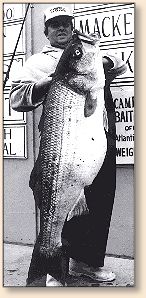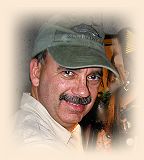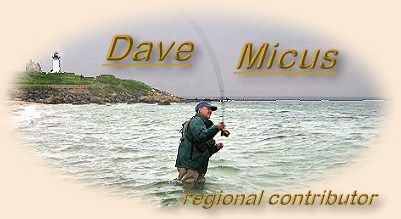|
Atlantic City is Mecca for striped bass
fishermen. It was there on September 21,
1982 at 10 pm, fishing from the Vermont Ave.
jetty during the front end of a Nor'easter,
that Albert McReynolds hooked a giant striped
bass. The fish, a whopping 78 lbs. 8 ounces,
has reigned as the world record for the past
23 years.

Much has been written about McReynolds and his
giant bass. The time it took to land the fish
varies from story to story (1 hour and 20 minutes
seems to be correct), and one recent story had
McReynolds fishing by the lights of a casino that
hadn't yet been built. Still, it's a story that
bears repeating. When McReynolds brought his catch
to Corky Campbell's tackle shop for the weigh-in,
word of his catch was already circulating. New York
Times writer Nelson Bryant contacted McReynolds to
tell him he was in line for a $250,000 prize offered
by Abu-Garcia for a world record fish. A wealthy
lodge owner also contacted the angler and offered
another $250,000 for the skin mount of the giant bass.
Then came invitations to dinners at the Explorer's
Club and appearances at sporting shows and banquets.
With one fish, the 36 year old McReynolds, a school
dropout who never learned to read or write, had
garnered celebrity and wealth unimaginable to a
sport fisherman.
Unfortunately for McReynolds, the story doesn't
end there. Primitive hunters, according to Joseph
Campbell, believed you only caught game you were
worthy of capturing, and there are plenty who argue
that McReynolds wasn't worthy. He was informed by
the owner of the freezer where the fish was stored
that it was not frozen properly, and ended up in
a dumpster along with $250,000 from the lodge
(though McReynolds suspects the fish was sold).
He received a barrage of letters accusing him
of fraud and worse. And even though he hired
an agent and financial manager, the money flowed
out faster than endorsements flowed in. In a
bizarre case of reality imitating art, he had
become Santiago.
McReynolds now lives on a small pension earned
from his days as an Atlantic City life guard.
All of the money from the fish is long gone,
as are any hopes for endorsements or speaking
invitations. When asked what he would do
differently, McReynolds answers "I wish I'd
cut the line." Yet for the past 20 years
McReynolds has searched the coast from Virginia
to Maine, driving a battered car and living in
cheap motels, a fishing Ahasverus who follows
the striper run in search of the one that didn't
get away.
But what of the fish?
A 78 lb 8 oz striped bass is a female and over
20 years old. It has spawned for 15 years, and,
in her later years, produced in excess of
4,000,000 ova. McReynolds bass was likely a
Chesapeake striper, traveling the coast northward
toward Maine in the spring, returning to the
Chesapeake in the fall. This bass had made the
trip at least sixteen times. I determined to
make a pilgrimage to Atlantic City to see McReynolds'
bass and the site of its capture.
I'd read that a mount of the fish hung in a bar
in South Jersey, providing the opportunity for
me to mix business with pleasure, but a
subsequent story said the bar had since closed.
It mentioned, though, that a small maritime
museum in Jersey housed a foam mount of the
fish. Small maritime museum is a rather vague
reference, but a search of the web yielded other
clues. The museum was located in Brigantine,
just east of Atlantic City. Further exploration
determined that the facility was not a maritime
museum at all, but the Marine Mammal Stranding
Center, an odd final resting place for a fish.
A concluding web search lifted all doubts; not
only was there a site for the center but within
the site was a photo of the monster fish.

I expected the Center to be a seasonal
enterprise, but called anyway and, luckily,
was told they would be open briefly the
following weekend, so I began making
arrangements for what is definitely an
off-season trip. For while I'll ten times
girdle the unmeasured globe; yea and dive
straight through it to feel a striper on
the end of the fly line, I'm unlikely to
drive six hours during striper season to
see one mounted on a wall.

The stranding center would only be open
from 10 to 2 and I can't risk being late,
so I leave Massachusetts at 4 am, an
appropriate time for a fishing expedition.
I arrive in Atlantic City at 10 am, and
head immediately to Brigantine and the
Center. The Marine Mammal Rescue Center
is a bit obscure and I drive right past
it. Backtracking, I notice the small
octagonal building and pull in to its
parking lot. The reception center is
one room and the walls are covered with
fish mounts donated by taxidermist Walt
Hires; mako and tiger sharks, dolphin,
and, occupying a good part of one wall,
the foam mount of McReynolds' world record
striped bass. The bass is colossal, and my
head could easily fit into its gapping mouth.
I stand and stare at the fish once listed in
the Guinness Book of World Records
as the world's most valuable game fish, the
fish that without malice poetically ruined
the life of the man who killed it. Though
it's been a long trip to get here, I'm not
disappointed.

I'm told by Maurice Temblay, the Aquarist
at the Center and an authority on McReynolds'
fish, that Corky Campbell's, where the catch
was recorded and my next stop, is no longer
in business, so I just head for my hotel.
A favorite cousin, a player in Atlantic City,
secured for me gratis a suite on the 31st floor
of a complex overlooking the ocean and the
Atlantic City skyline, much nicer digs than
a poor fishing writer is used to.

In a karmic coincidence, I can look down
from my balcony onto the Vermont Ave. pier
where McReynolds took his fish, and I leave
the hotel and walk the two blocks to the
jetty. It is January, unseasonably cold,
and the bass are long gone. But as I gaze
at the water I see something; there, a big
swirl. Is it the progeny of Reynolds' bass,
now 22 years old and even larger than the
record fish? I stare at the dark Atlantic
but nothing stirs. ~ Dave
About Dave:
 Dave Micus lives in Ipswich, Massachusetts. He is an
avid striped bass fly fisherman, writer and instructor.
He writes a fly fishing column for the Port City Planet
newspaper of Newburyport, MA (home of Plum Island and Joppa Flats)
and teaches a fly fishing course at Boston University.
Dave Micus lives in Ipswich, Massachusetts. He is an
avid striped bass fly fisherman, writer and instructor.
He writes a fly fishing column for the Port City Planet
newspaper of Newburyport, MA (home of Plum Island and Joppa Flats)
and teaches a fly fishing course at Boston University.
|











